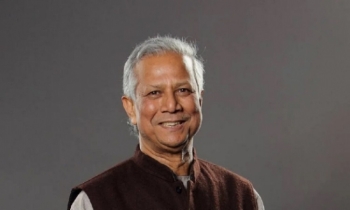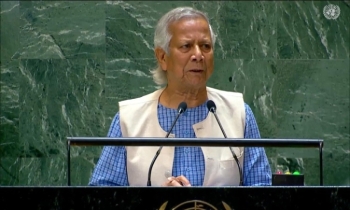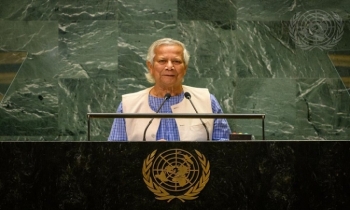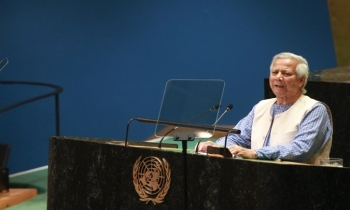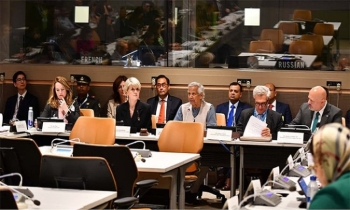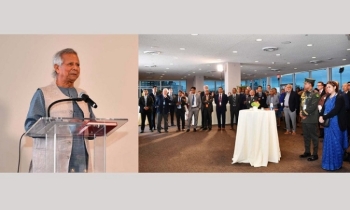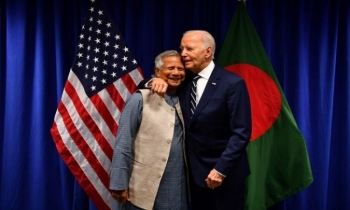Bangladesh, IOM call for urgent action on climate migration
BI Report || BusinessInsider

Photo: Courtesy
Bangladesh and International Organisation for Migration (IOM) on Monday called for united and urgent action on climate change saying it is a key adverse driver of displacement and migration, often exacerbating existing vulnerabilities and fueling unsustainable urbanization.
Unless concerted action is taken immediately, the negative impacts of climate-induced migration will be sharply felt by millions of people in Bangladesh and across the globe, speakers said during a policy dialogue on Human Mobility in the Context of Climate Change: Towards a Common Narrative and Action Pathway, jointly convened by the Ministry of Foreign Affairs (MoFA) and the IOM at the Bangladesh Foreign Service Academy.
The dialogue served as a forum to voice the different perspectives from the government, civil society, private sector, and the international community, as well as the media.
The event brought together these key stakeholders - who need to work together on a more comprehensive and holistic way forward to address and mitigate the effects of climate change, and the impact of these effects on human mobility.
The discussion focused on taking stock of the existing progress made and looking ahead to ensure Bangladesh is in the best position possible to advance global discussions on the migration, environment and climate change nexus, in particular in the lead-up to the United Nations Framework Convention on Climate Change’s (UNFCCC) Climate Change Conference (COP27) in Sharm El-Sheikh, Egypt in November this year.
In his chief guest speech at the event, Foreign Minister AK Abdul Momen warned that the international community cannot afford to remain oblivious to the issue of climate migration.
He highlighted the difficult challenges the government is facing to foster decent living conditions for the internally displaced people while it continues to maintain the trajectory of socio-economic development.
Momen said that due to the relentless diplomatic efforts of Bangladesh, the international community is gradually opening up to the crucial issue of creating additional financing mechanisms for climate-generated loss and damage.
Opening the Policy Dialogue, Foreign Secretary, Ambassador Masud Bin Momen highlighted the various initiatives taken by Bangladesh to raise the issue of climate-induced migrants globally.
“Vulnerable countries like Bangladesh need adequate finance and technology to respond to climate change-related challenges, Foreign Secretary emphasised.
While strong global action is needed to meet the Paris Agreement’s goal of limiting the future temperature increase to less than 2°C by the end of this century, there is also an urgent need for countries to integrate climate migration into national development plans and national policies.
Overall, the number of Bangladeshis displaced by the impacts of climate change could reach 13.3 million by 2050, making it the country’s number-one driver of internal migration, according to the World Bank, he said.
Acknowledging the importance of the issue, the Bangladesh government has begun mainstreaming climate change adaptation (CCA) and disaster risk reduction (DRR) into its development planning frameworks.
Within several of these frameworks, human mobility has also received attention.
For example, the Bangladesh government has enacted a “National Strategy on Internal Displacement Management”.
Climate migration is referenced throughout major policy documents governing climate change and wider development issues of the country, including the Bangladesh Climate Change Strategy and Action Plan (2009), the 8th Five Year Plan 2021-2025 and the Mujib Climate Prosperity Plan Decade 2030.
Saber Hossain Chowdhury, MP, Chair of the Parliamentary Standing Committee on the Ministry of Environment, Forest and Climate Change and Honourary President of the Inter-Parliamentary Union, said, “Concerted action on climate change mitigation and adaptation, together with inclusive development policies and embedding climate migration into policy and planning could help address climate migration. Policy decisions will shape the extent to which the effects of climate change will be positive for migrants and their families."
During the dialogue, Caroline Dumas, Special Envoy for Migration and Climate Action, IOM, delivered a keynote address on ‘Global and Regional Consultative Processes and Policy Frameworks,’ while Golam Rabbani, head of Secretariat, Climate Bridge Fund, shared a detailed overview on ‘Human Mobility in the Context of Sudden and Slow-Onset Events and the Adverse Effects of Climate Change in Bangladesh’.
Joining the discussion, Ugochi Daniels, IOM’s deputy director general for Operations, stressed that “as the UN Migration Agency specialising in providing migration policy and operational knowledge support, IOM works as a convening agency for climate migration, as reflected in our Institutional Strategy on Migration, Environment and Climate Change 2021–2030. IOM is strongly committed to developing solutions for people impacted by climate change, including people on the move, people seeking to move and those seeking to stay.”
Gwyn Lewis, UN resident coordinator in Bangladesh, said, “Climate migration issues feature strongly in Bangladesh’s United Nations Sustainable Development Cooperation Framework (UNSDCF) 2022-2026 and the UN family remains committed to supporting the Government of Bangladesh to deal with the adverse effects of climate change.”
Farhina Ahmed, secretary, Ministry of Environment, Forest and Climate Change, Saleemul Haque, director, International Center for Climate Change and Development (ICCCAD), Atle Solberg, head of the Secretariat, Platform on Disaster Displacement, Dilruba Haider, programme specialist, UN Women also spoke at the event.
At the close of the dialogue, IOM Bangladesh’s Chief of Mission, Abdusattor Esoev, reiterated IOM’s commitment to continue work with the government of Bangladesh and all other key stakeholders on climate migration.
The outcome document of the dialogue will help Bangladesh government shape relevant national, regional, and global consultative processes and policy frameworks.


